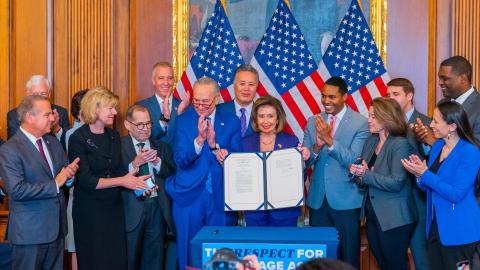Equality Caucus Releases Inaugural Report on the Condition of LGBTQ+ People in the United States
WASHINGTON, D.C. – Today, the Congressional LGBTQ+ Equality Caucus released its Inaugural Report on The Condition of LGBTQ+ People in the United States. Spearheaded by Chair of the Equality Caucus Rep. David N. Cicilline (RI-01), the report summarizes data relating to the experiences of the LGBTQ+ community in four key areas: Education, Economic Security, Health Care, and Housing. The report is intended to educate the public on the significant disparities LGBTQ+ people experience and serve as a benchmark by which the country can judge its progress on LGBTQ+ rights in the years to come.
"LGBTQ+ people deserve the same opportunities to thrive as their non-LGBTQ+ peers. The data presented in this report shows, however, that the lived experiences of LGBTQ+ people are vastly different than those of our straight and cisgender neighbors," said Chair Cicilline. "With the increasing rise of violence against the LGBTQ+ community and the growing number of anti-LGBTQ+ bills being introduced in state legislatures and in Congress, it is especially critical that all levels of government work to ensure true lived equality for LGBTQ+ people. This includes by finally enacting the Equality Act into law to ensure comprehensive explicit nondiscrimination protections for LGBTQ+ people. Our ability to thrive in this country should not be limited due to our sexual orientation or gender identity. The fight for equality in this country will not be over until we address all of these disparities and create true equity for the LGBTQ+ community."
The Inaugural Report on the Condition of LGBTQ+ People in the United States covers the following topics with data highlighting existing disparities that members of the LGBTQ+ community face.
EDUCATION: K-12 Education; Higher Education
- LGBTQ+ harassment and exclusion are pervasive in the education system, which often manifest in a hostile school environment.
- The LGBTQ+ community faces higher rates of bullying and discrimination than cisgender and straight students in schools.
- A hostile environment and lack of affirming spaces has led to disproportionate outcomes in school performance, attendance, and social inclusion for LGBTQ+ students.
LGBTQ+ students face many obstacles, including harassment and discrimination, which impact their ability to learn in a safe and affirming environment. Many state legislatures have passed policies that specifically harm LGBTQ+ youth, including bans on transgender students' ability to play sports, curriculum censorship laws, and laws limiting transgender people's ability to access the correct restroom. These laws are likely to further exacerbate the challenges that LGBTQ+ students already face in educational settings.
ECONOMIC SECURITY: Discrimination and Economic Insecurity; Poverty and Food Insufficiency
- LGBTQ+ people disproportionately face economic insecurity as they struggle with employment discrimination and higher unemployment rates than their non-LGBTQ+ counterparts.
- This impacts their ability to afford and secure food as many live in poverty and struggle with food insufficiency.
- Within the LGBTQ+ population, transgender individuals face additional challenges securing jobs and accessing promotions than their cisgender counterparts.
LGBTQ+ individuals are faring worse than non-LGBTQ+ people as they struggle with higher poverty rates and less access to food. Discrimination against LGBTQ+ people impacts the community's ability to access higher paying jobs and economic resources, which in turn impacts their ability to afford food and feed themselves and their families.
HEALTH CARE: Access to Health Insurance and Health Care; Disease Disparities; Mental Health
- Due to stigmatization, discrimination, and a lack of culturally competent health care providers, LGBTQ+ people do not have the same access to affordable, affirmative, comprehensive health care as their counterparts.
- LGBTQ+ people, especially transgender people, face many challenges to finding general physicians, specialized doctors, and gender-affirming care.
- Members of the LGBTQ+ community are at a higher risk of certain conditions such as obesity, addiction, and cancer, have less access to health care, and generally have worse health outcomes.
- LGBTQ+ people experience disparities compared to their non-LGBTQ+ counterparts in key aspects of their health, including in mental health, behavioral health, and physical health.
From accessing health insurance to culturally competent care, LGBTQ+ people face additional barriers than their non-LGBTQ+ peers when it comes to staying healthy. Discrimination, stigma, and other factors lead LGBTQ+ people to have worse health outcomes, including mental health outcomes, than their straight and cisgender counterparts. As elected politicians across the country continue to attack the ability of LGBTQ+ people to access care, especially the ability of transgender and nonbinary youth to access gender affirming care, LGBTQ+ people are likely to experience additional hurdles to their physical and mental wellbeing.
HOUSING: Homelessness in the LGBTQ+ Community; Accessing Affordable and Safe Housing
- In the United States, the LGBTQ+ community faces higher rates of homelessness than non-LGBTQ+ people and more challenges accessing affordable housing.
- These disparities can be especially pronounced for LGBTQ+ youth and LGBTQ+ people of color.
- Transgender individuals face unique struggles accessing housing, and the COVID-19 pandemic has further exacerbated these struggles.
LGBTQ+ people face higher rates of homelessness than non-LGBTQ+ people. They struggle with securing safe and affordable housing more than their straight cisgender counterparts and are more likely to experience homelessness. LGBTQ+ youth also disproportionately struggle with homelessness, often because they are kicked out of their living situations by their parents.
Read the full Inaugural Report on the Condition of LGBTQ+ People in the United States here.
Founded in 2008, the mission of the Congressional LGBTQ+ Equality Caucus is to promote equality for all, regardless of sexual orientation or gender identity. The Caucus, which is led by the nine openly LGBTQ+ members of the House of Representatives, is strongly committed to achieving the full enjoyment of human rights for LGBTQ+ people in the U.S. and around the world.
###
